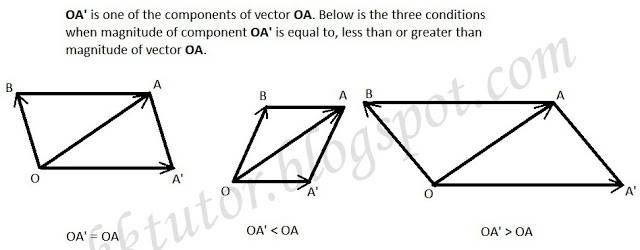the question was:
The component of a vector is
(a) Always less than its magnitude
(b) Always greater than its magnitude
(c) Always equal to its magnitude
(d) None of these
according to me ans will be none of these because
The magnitude of the component of a vector (projection) may be less than or equal to the magnitude(never more than it.) of the vector itself which will depend on what you are taking the components along. The magnitude of the component may be equal to the magnitude of the vector if and only of the projection is taken along itself, otherwise, it will always be less. For instance, consider a vector 4i where i is a unit vector along the x-axis. Now the magnitude of the component of this vector along the x-axis is 4, same as that of the vector. Now, consider a vector 3i+4j, where i and j are unit vectors along x and y-axis respectively, the magnitude of this vector is 5 but the magnitude of components of this vector are 3 and 4 along the x and y-axis respectively.
but my teacher told me:
The component of a vector may be less than, greater than or equal to its magnitude.
i didnot understood how the component can be greater than the vector itself
on asking he showed me this :
my question is : can a vector have components in any set of two directions you choose that may not be mutually perpendicular. ?

